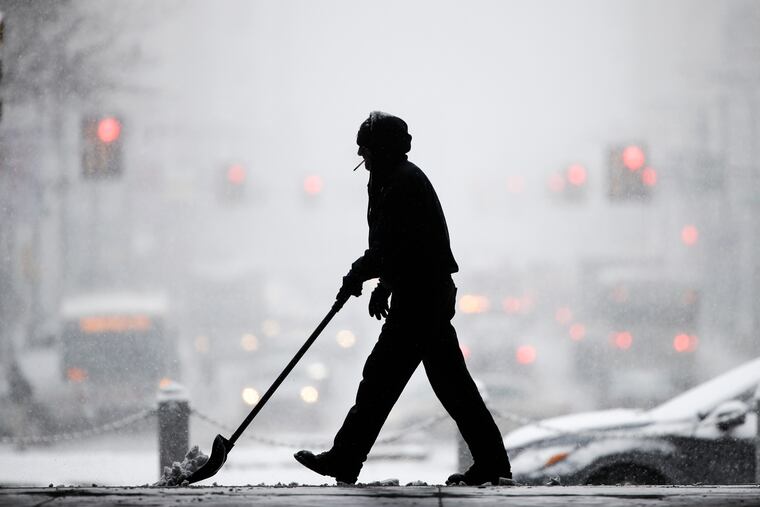Will Philadelphia and the Northeast U.S. lose our seasons to climate change? Not if we can help it. | Opinion
Winter temperatures in the Northeast U.S. are warming the fastest—as quickly as three times the rate of increasing summer temperatures.

What should have been an idyllic seasonal ceremony this week was marred by poor weather. Wednesday night’s annual tree-lighting ceremony at City Hall was warm and rainy — a far cry from the snowy scenes we look forward to this time of year and those that fill our parents’ memories.
Ceremonies like this serve as a reminder that the seasons, perhaps more than any other factor, form the basis of our shared cultural identity.
Yet this framework by which we live is beginning to change.
Throughout Pennsylvania and each of the Northeastern states, the seasons are undergoing notable shifts. Since the mid-20th century, the Northeast has seen more warm and wet extremes — longer heat waves, heavier downpours — and fewer cold extremes — more rain rather than snow, fewer frost days. Seasonal differences we have come to expect — cold and snowy winters, rainy springs, hot and humid summers, and cool, dry falls — are beginning to blur.
Winter temperatures in the Northeast are warming the fastest — as quickly as three times the rate of increasing summer temperatures. More mild winters and an extended transition into spring portend an uncertain and potentially dangerous future. Consider fewer frost days and wetter springs that allow ticks to survive year-round, extending the period of heightened risk of Lyme disease transmission.
» READ MORE: Philadelphia launches regional collaborative to tackle climate change, recycling, renewable energy
These impacts transcend ecological and environmental concerns alone, of course. Mild winters also mean less snowfall in some areas, directly affecting the localized, rural economies that depend on seasonal tourism and outdoor sports. Take skiing and snowboarding, for example -- both popular in the nearby Poconos. Unsurprisingly, participation correlates with the amount of snow: more snow, more riders. One study commissioned by the nonprofit Protect Our Winters found that low snow years in 2001-16 resulted in a loss of $1 billion and 17,400 jobs nationwide compared with an average year.
As for the Christmas trees? Extreme shifts in spring and summer precipitation patterns wreak havoc on young saplings, decreasing the probability that they will mature into a healthy six- to eight-year-old tree for harvesting. Increased temperatures year-round allow diseases to spread and pests to survive, promoting tree mortality. These pressures, combined with an aging farmer population and economic impacts, have contributed to nationwide Christmas tree shortages for three years running.
As our seasons shift toward new and unfamiliar states, our relationship with them will necessarily change. While we can’t regain the conditions of winters past, we can avoid worsening the complete loss of winter as we know it.
It takes only a quick Google search to discover those actions that we can each take to address climate change. In the environmental sciences, we have identified a small handful as particularly impactful: reducing/eliminating airplane travel, decarbonizing home electricity, and eating less red meat. One action with particularly outsize impact is considering planning for a smaller family size, though that’s a far more complicated and profound decision. No matter how big or small, every action matters.
To tackle these decisions strategically, start by quantifying your carbon footprint using a carbon calculator. Many online versions exist; I like the University of California-Berkeley’s CoolClimate Calculator.
» READ MORE: We need to courageously confront climate change in 2019 | Opinion
Individual actions can go only so far. To scale up climate action at the rate we need, top-down policy changes will be essential. Getting there starts with meaningfully engaging in climate conversations.
Like a growing majority of Americans, Pennsylvanians recognize that climate change is happening, but they don’t believe it is affecting them personally and almost never discuss the issue with family and friends. Building community consensus for strong climate policies starts with individuals — never underestimate the power of an authentic conversation.
Here are some simple tips to keep in mind:
Start by identifying shared values. What do you have in common? Perhaps a shared love of outdoor sports, seasonal family traditions, or a favorite food. Entering conversation on equal footing creates space for constructive dialogue.
Commit yourself to listening to others’ opinions and concerns. Ask open-ended questions and listen — an act that is often easier said than done.
Discuss concrete examples. But you don’t have to be the expert. Anecdotal stories about how you see the shifting seasons’ impact on your own life, and why that matters to you, are most relatable.
Pivot to finding solutions. Conversations are made most productive when a readily achievable action is discussed, and even better when a collaborative commitment to act is made — such as agreeing to opt for public transportation more frequently, or reducing one meat meal a week.
It is with no irony that I say the holiday season is the ideal time to engage in a climate conversation. We may as well list climate change after sex and politics on the list of what not to discuss at the dinner table, but the immediacy of the climate crisis demands far more of us than silence. Our future seasons — and our future selves — depend on it.
Rachel Valletta is the environmental scientist at the Franklin Institute. rvalletta@fi.edu @ErraticsFanatic